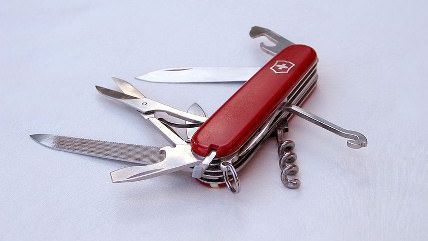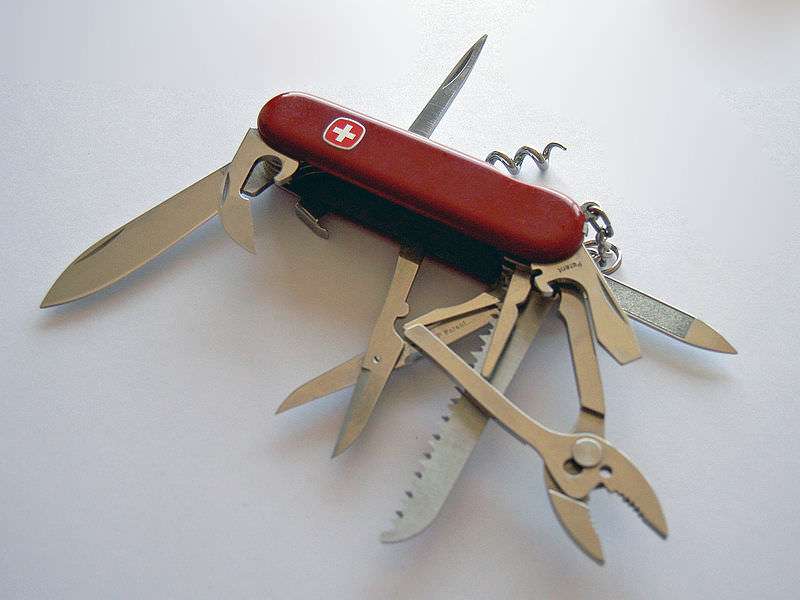Knife Control? Canadian Crimes Trigger Fretting Over Blades.


Once upon a time, gun rights advocates warned that when the control freaks were done piling restrictions on firearms, they'd discover that violent crimes failed to evaporate and so next turn their attention to anything sharp or pointy. After all, people have committed mayhem on one another with blades ever since some long ago caveman realized that the sharp piece of flint in his hand looked like a good fit for an annoying neighbor's neck. Well, rest assured that the doomsayers were right: After a couple of nasty stabbings in Canada, knife control is on the radar north of the border.
To their credit, though, many people seem to realize that restrictions on sharp things may be even less enforceable than eternally pointless gun controls.
Knives are already more intrusively regulated than many people realize. As A. Barton Hinkle noted noted earlier this month, "The laws governing knives can be surprisingly restrictive—and in some ways even more restrictive than firearms laws." In his home state of Virginia, concealed carry permits are available for handguns, but not knives.
Knives are one of the world's oldest weapons, and they continue to feature in violent crimes. In 2011, 17.2 percent of American homicides were committed with a "knife or blunt object"—almost as many as were committed with long guns. In Britain and Canada, the number is closer to one-third.
On Tuesday, five people were murdered at a Calgary house party by a knife-wielding man in a crime police call "the worst mass murder in Calgary's history." The same day, four people were stabbed at a mall in Regina, Saskatchewan, and a student was stabbed at an Ontario high school.
Now Canadians are talking about—you guessed it—knife restrictions. Edmonton already considered banning "dangerous knives." Saskatoon discussed the same.
In the U.S., a Pennsylvania high school suffered a horrendous knife attack just last week, leaving 20 people injured. In contrast to Canada, that triggered little, if any, serious discussion of restricting bladed weapons. That may be for the same reasons that derailed the earier Canadian efforts and has some pundits admitting the limits of of any future legislation: Bans and restrictions really don't work, and knives are impossible to regulate.
In 2010, Glen Luther, a law professor at the University of Saskatoon, said about a proposed ban, "How can you ban knives without coming to grips with the fact that they're used lawfully by people from all walks of life?"
Just today, Brian Zinchuk, a columnist for Saskatchewan's Battleford's News-Optimist commented, "The gun kooks were right. Take away their guns, and people will turn to knives." He added:
When the gun control debate was going strong, this came up. Some gun advocates, in pointing out that registration did not stop crimes, mockingly said what was next, registering knives?
Well, as horrible as it sounds, they had a point.
The gun registry came and went, and gun crime still occurred, although thankfully, Canada has not seen a rash of gun massacres since Ecole Polytechnique and Taber.
What can we do about knives? Not a damned thing.
Knives are the most basic of tools, going back to sharpened rock and bone. We cannot function without them. We can't even eat without them. No amount of regulation, legislation or feel good campaigns can effectively control knives, although I'm sure someone is going to try.
Criminologist Janne Holmgren even told the CBC that the push for knife restrictions is a "moral panic" and that "sometimes fear drives a lot of legislation, unfortunately."
Good thought. We need more like them—or maybe Janne should just print that on a card and hand it out.
As it turns out, Matthew de Grood, the mass murder suspect in Calgary used a kitchen knife—one that he grabbed on the way through the house where the crime occurred.
Some British physicians have a proposed solution for that: They want to ban sharp tips on kitchen knives. Yes, that's a serious proposal. Well, it's intended to be serious, even if there's a Monty Python-esque quality to the idea of restricting paring knives lest somebody run amuck.
What's next? Banning baseball bats?
Probably so. But that will also run into a fundamental problem: No particular weapon is an indispensable item. Weapons exist on a continuum of objects able to cause mayhem. Guns, knives, cans of gasoline (as killed 87 people in the Happy Land arson)—they're just tools that can be replaced.
People are the real weapons. When people decide to be dangerous, they just find tools that will help them do the job.
Note: Arizona, where I live, has awesome knife laws. Everything sharp and pointy has been legal since 2011.
Show Comments (69)